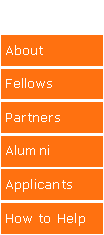


|
Fellows’ Flyer |
|
July 2009 |
|
News and views for and by Princeton in Africa Fellows |


|
In this Issue: |
|
Highlights from 2008-2009 Fellow |
|
Happy Birthday |
|
July 15 Beza Tesfaye
July 17 Stephanie Keene |

|
SAVE THE DATE!
Princeton in Africa Annual Benefit
October 1, 2009
New York City
A special Princeton in Africa Lifetime Achievement Award will be presented to Julius Coles *66, retiring president of Africare for a lifetime of service to Africa
The Princeton in Africa Medal will be presented to Thomas C. Barry, CEO and founder of Zephyr Management
Invitations will be mailed soon! |
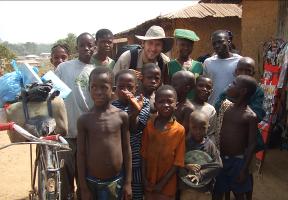
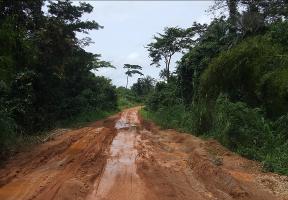
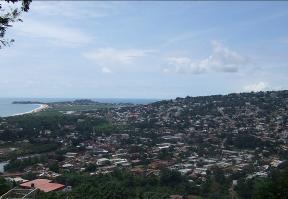
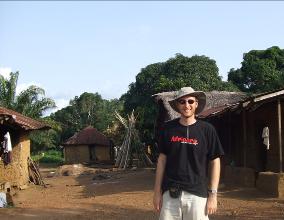
|
Alumni Gathering & Open House |
|
The road from Freetown to Kailahun (it takes six hours to go 60 miles) |

|
Padi, kushe-o, and greetings from Da Sweet Salone! That’s what Sierra Leoneans typically call their country, though at this time of year they could easily call it Da Wet Salone. Freetown is the rainiest capital city in the world, averaging over 3 meters of precipitation per year. A visitor spending the months of January through March here would never know this, however. Almost all the rain falls between May and September, a wet season that is slow in beginning this year. For the last month it has rained several nights a week, but nothing like the massive daily drenchings that June should bring. This is great news for beachcombers, but unwelcome for farmers dependent on wet soils for their crops. One of the missions of Africare, the Washington-based NGO I work for here, is to improve farmers’ crop rotation and promote modern planting techniques so that agriculture is less dependent on (the now less than) regular weather patterns. It’s no small task, but it’s one that Sierra Leonean farmers have confronted with great optimism and hope.
Sierra Leone is, after all, a country founded on hope. In 1787, 400 former slaves sailed into Africa’s largest natural harbor and founded the settlement of Freetown. Four years later, the colony received a royal charter, and became a haven for over a thousand African Americans who had won their freedom in exchange for their loyalty to the Crown during the American Revolution. The Creole (or Krio) people brought to their new continent a spirit of hope for the future, as well as their colorful, English-based language. The Krio language is still the lingua franca of Freetown (even though descendants of freed slaves make up less than 1% of the population), and it includes vocabulary from French, Portuguese, Mende and other West African languages, as well as words that have become obsolete in Standard English. Motorcar, yonder and vexed are all still used, as in “De motocah deh yondah no deh, na meself bohku vex!” The spirit of hope still pervades the country too: despite having the lowest HDI (Human Development Index) in the world, and having lived through a horrific, ten-year civil war, Sierra Leoneans remain an optimistic people. And slowly but surely, the country does seem to be coming back. In the ten months that I’ve been here, I’ve seen some new businesses open, and the roads to the provinces get progressively more paved.
I didn’t know much about Sierra Leone when PiAf offered me a fellowship in Freetown. I had seen the movie “Blood Diamond,” so I had gotten the Hollywood version of the war. The landscapes looked pretty, and the culture warm and friendly—and there was always the off chance of running into Jennifer Connelly in a beach bar. Sounded like a pretty sweet deal. It was only three months into my fellowship that I learned that the movie was not filmed in Sierra Leone at all. And despite frequenting several beach bars, I have yet to run into Jennifer Connelly. Still, the warm culture, friendly people, and spectacular beaches are very much here, as well as a tight-knit community of NGO workers in which one degree of separation is the norm. Sierra Leone, as a least-developed country, has very little leisure industry (e.g., cinemas, entertainment venues, etc.), but with friends around I haven’t missed it. I pass away my non-working hours at the beach, playing backgammon, watching pirated Chinese DVDs, and going out to Paddy’s (a cross between the club from the Snoop Dogg videos and the Mos Eisley Cantina) on weekends.
My working hours keep me busy too. Africare has been in Sierra Leone continuously since 1984, one of the few NGOs to stay on throughout the war. Though I have the title of Public Health Intern, I’m something of a jack-of-all-trades about the office: I work on coordinating and proposing projects that combat the spread of HIV/AIDS, and promote hygiene and sanitation, maternal and child health, and developing agriculture initiatives. I have scouted out primary schools for a school-feeding program, delivered applications for funding proposals, and sweet-talked my way through government meetings. All the while, I’ve been recounting my adventures in my blog, freetowncalling.blogspot.com. Quite the ten months! |
|
by Tom Dollar, ‘08-’09 Fellow at Africare in Sierra Leone |
|
Notes from the Field |
|
Tom in a village in Sierra Leone’s Kailahun District |
|
A view of Freetown |

|
Tom poses with kids who received HIV education from Africare in the town of Baiima |
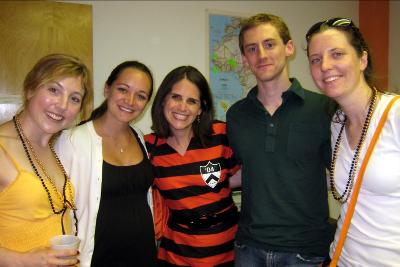
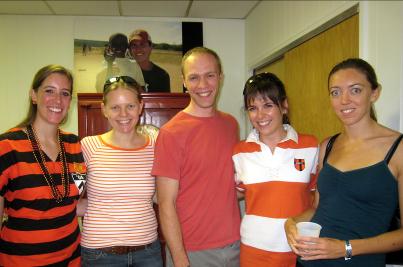
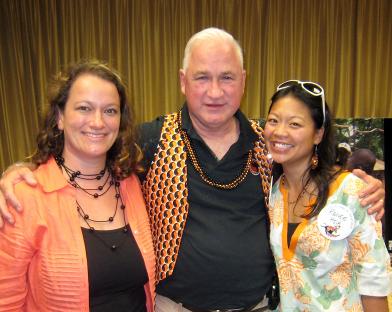
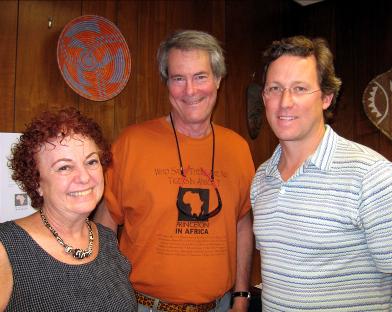
|
It was wonderful to see so many alumni and friends of PiAf on May 30th! Thanks to all who dropped by. |
|
2009-2010 Fellows Update
Several of our newest class of PiAfers (which now consists of 25 Fellows who will work with 14 different organizations in 16 countries) have already departed for Africa to begin their fellowships. For more information about our new Fellows—including pictures, bios, and where they have been placed—click here. |
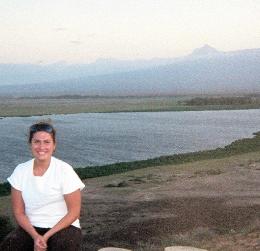
|
One of our new Fellows, Allison Williams ‘09, says, “I knew when I accepted the Princeton in Africa fellowship it would provide me with an experience that would change my life. I am very excited about starting my post at the Mpala Wildlife Foundation in Kenya, which is in arguably one of the most beautiful places on earth. PiAf has given me the opportunity to face new challenges, meet new people, and enjoy different cultures and I can not wait to begin!” |

